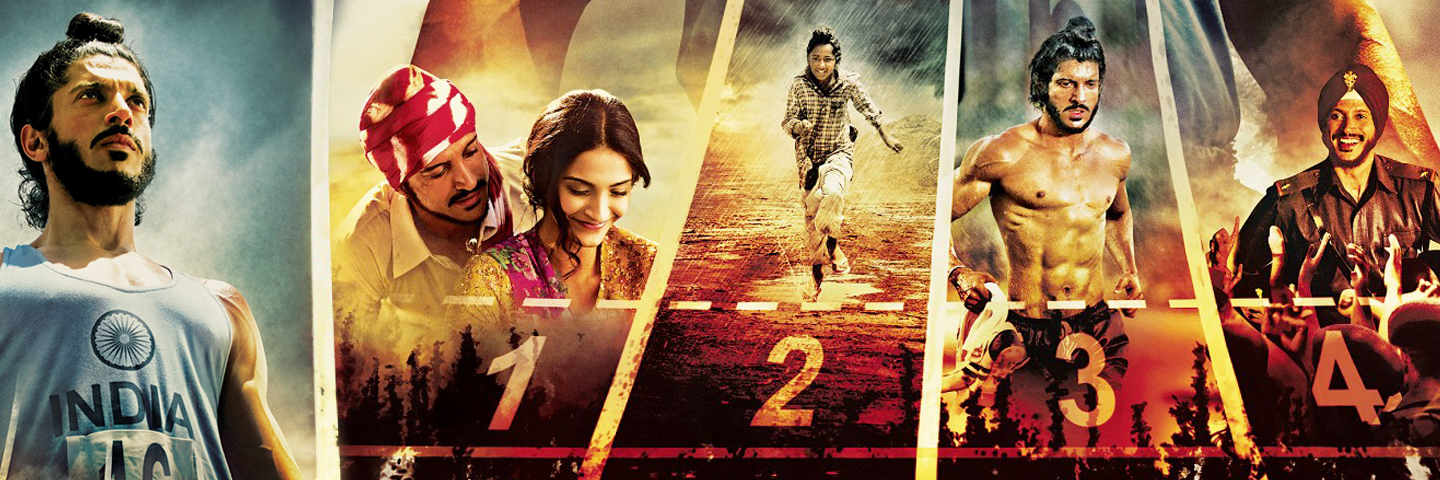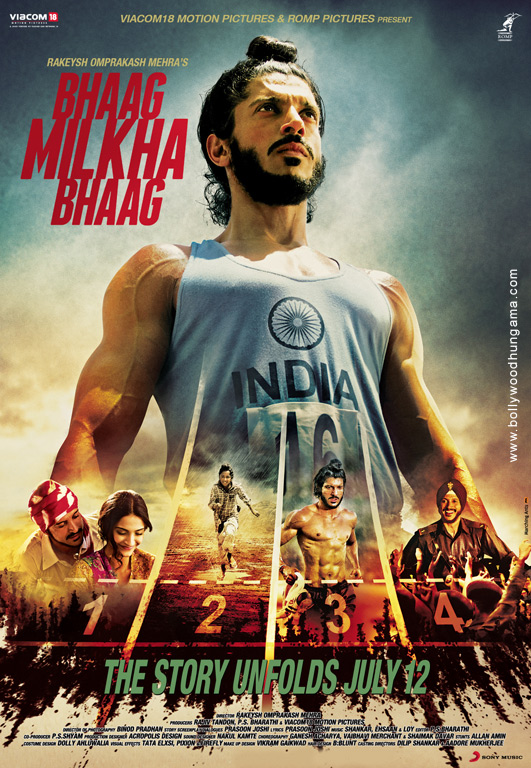Sprinting through the 400m track, Milkha Singh flies with a dream to win glory, with purpose to shine for his country and reason, to overcome his weakness. Honed by expert coaches and disciplined by the Army, Milkha Singh achieves what no athlete could with his background.
The finest visionary filmmaker, Rakeysh Omprakash Mehra (R.O.M) introduces Milkha's childhood to delineate the events and circumstances that made the orphaned refugee a world class athlete. The inspiring real life story is nothing short of epic on the cinema screen with Farhan Akhtar, embodying a soulful portrayal of R.O.M's envisioned protagonist.
The parallel storytelling smoothly transitions between the humble beginnings of young Milkha, the events of partition that led to him taking refuge in Delhi's camps and his rebellion against his circumstances that made his coal-blackened hands hold the Indian Army's guns. It was at the Army camp that Milkha got the opportunity to represent the country as a runner and it wasn't until he went through rigorous training and transformation to fight his inner demons to overcome his horrifying past, that we see Milkha's ultimate success and recognition as the Flying Sikh.
It all begins with the race at the Roman Olympics when Milkha Singh failed to clench victory. A distraught Milkha has the opportunity for reclaiming glory in Pakistan, where his original home and memories remain. Those memories are of a fun-filled childhood when he ran barefooted across open fields. Those memories are also of him running away from his village where he witnessed the slaughter of his family. Partition drove Milkha to the refugee camp in Delhi where he reunited with his sister, only to run away from his circumstances to liberation. Stealing coal from moving trains and a rebellious zeal were the premise of Prasoon Joshi's outstanding lyrics for the song Zinda that plays through his transition. This song will remain an anthem for the ambitious, driven youth.
Love takes over Milkha's life with the innocent Biro charming her way into his heart. But Milkha's inability to find a respectable livelihood separates him from his love with a newfound ambition. The Indian Army is where he learns about respect and a cross-country trial was where his talent was recognized. Milkha had been running all his life. He ran for fun, he ran from fear, he ran to rebel and he even ran for milk. It was now time to run for glory.
Milkha Singh poured sweat and blood while training. While being completely dedicated to running, his affair with an Aussie girl prior to the Melbourne Olympics distracted him from the cause and he failed to qualify. Disappointed with himself, Farhan portrays the raw emotion with punishment in front of the mirror. His next goal is to break the 400m world record and when the aims are that high, so are the training grounds. R.O.M has showcased Ladakh in all its desolate beauty. One can appreciate the harshness of the environment where Milkha trains rigorously for yet another transformation, this time a more physical one. Farhan's painstakingly developed brawn is that of an athlete and one has to applaud his genuine effort.
Over time, Milkha Singh achieves success on the track and unimaginable glory for the nation. However, after the Roman Olympics, even the Prime Minister urges him to run in Pakistan but that land is a deep scar in Milkha's memory and he will have to fight his demons to overcome his weakness. With renewed focus and nothing to distract him from running to the finish line, Milkha attains the title of the Flying Sikh with his epic victory.
Rakeysh Omprakash Mehra has brilliantly visualized an inspiring story of the legend, ofcourse adding his own dramatic elements, and given us a masterpiece to live by. In familiar styling of setting distinct color tones for flashbacks and using ultra-slow motion photography, he greatly enhances the visual feel of several important scenes. Rather than straying into prolonged sequences of Milkha Singh's accomplishments on track, Mehra focuses on the events and circumstances that made the Singh the Flying Sikh. The events of partition, loss of parents, life in the camps, stealing as a means of survival, losing love to society's cliches, finding respect in the Army and mentoring by his coaches were the influences that shaped the young man into a world-class athlete.
Farhan Akhtar had spent days with the living legend, understanding his character while transforming his physique to appear athletic. His dedication to the character and his own contribution to its depiction are truly remarkable feats because you do see him as Milkha Singh and not Farhan Akhtar. That, in itself is one of the greatest achievements of an actor; to immerse into the character so deeply that the audience fails to recognize who you really are. Farhan's sincere performance gives us a much needed insight that no documentary could have. In essence, he briefly re-lives Milkha Singh for the generations that did not witness his glory. Such a performance is to be cherished and must hail accolades at ceremonies.
Sonam Kapoor in a brief role as Biro is charming and vital to the story's evolution. Japtej Singh as young Milkha is versatile with his emotions and has a good understanding of the character's circumstances. Divya Dutta is a great talent and has been used wisely by Mehra to bring an emotional balance in Milkha's life. Yograj Singh as National team Coach Ranvir Singh is simply outstanding as Milkha's progressive mentor. Perhaps the most heartfelt and genuine performance is of Pawan Malhotra as coach Gurudev Singh. His emotions are keenly felt and as exemplary an actor as he is, one must appreciate Mehra's casting that brought the best out of him.
Shankar-Ehsaan-Loy's return after a lull period justifies the time spent in creating the score for this film. From the uplifting background score to the petulant theme of Gurbaani that is enhanced by Daler Mehendi's passionate vocals, the trio have variety and pertinence for the film's subject. While Mera Yaar, Rangrez, Slow-motion angreza are tracks that could be edited to make the film tighter, they are still melodious tracks to listen to. Arif Lohar's Bhaag Milkha Bhaag is a subtle anthem for his training in Ladakh but its effect is definitely uplifting. The rock version by Siddharth Mahadevan is inspiring and suited to the end credits. Maston ka jhund is catchy, fun and similar to Khalbalee in its effect. But the film's best track is the powerful Zinda that catches the spirit of Milkha Singh. It's the song that works while passing cars on the highway, in the gym, bathroom, while running or even jumping over train compartments. Kudos to Siddharth Mahadevan for its captivating vocals.
Rakeysh Mehra has adroitly used technologies to enhance the film's emotional feel. Milkha's feet running over sands, him running over train compartments and crossing the finish line in slow motion are visuals that one cannot erase from the mind. He captures the essence of the dedicated athlete for whom running meant more than just a sport. It gave purpose to his life. Prasoon Joshi's writing is yet again commendable and has more impact when visualized by Rakeysh Mehra.
The hard work put in by everyone in the film is apparent in its realistic depiction. The sincerity is keenly felt and the passionate portrayal of Milkha Singh is warmly embraced. There might be a song too many and a sequence or two prolonged, but Milkha Singh's story is an important one nevertheless because it reminds us that there are no shortcuts to success. It comes at the cost of sacrifices, buckets of sweat and ounces of blood in its journey.
- 9.488 on a scale of 1-10.


